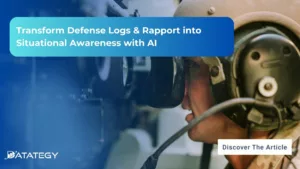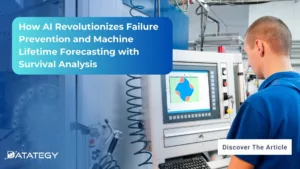How AI-Powered Anti-Drone Solutions Transform Defense Operations? Drones are everywhere...
Read MoreHow Can AI Revolutionize Risk Management in Oil & Gas?
Table of Contents
ToggleRisk management is an essential component in the complex world of oil and gas operations. There are many dangers, like not following rules and threats to operations and staff safety on land and sea sites.
Artificial intelligence (AI) has demonstrated the potential to be a beneficial ally in controlling and reducing these risks as the business continues to change due to digital transformation. A recent study by Accenture found that AI could save the oil and gas industry $18 billion per year by 2025 by improving safety.
Find out how papAI can improve the deployment of AI projects in the Oil and Gas Industry.
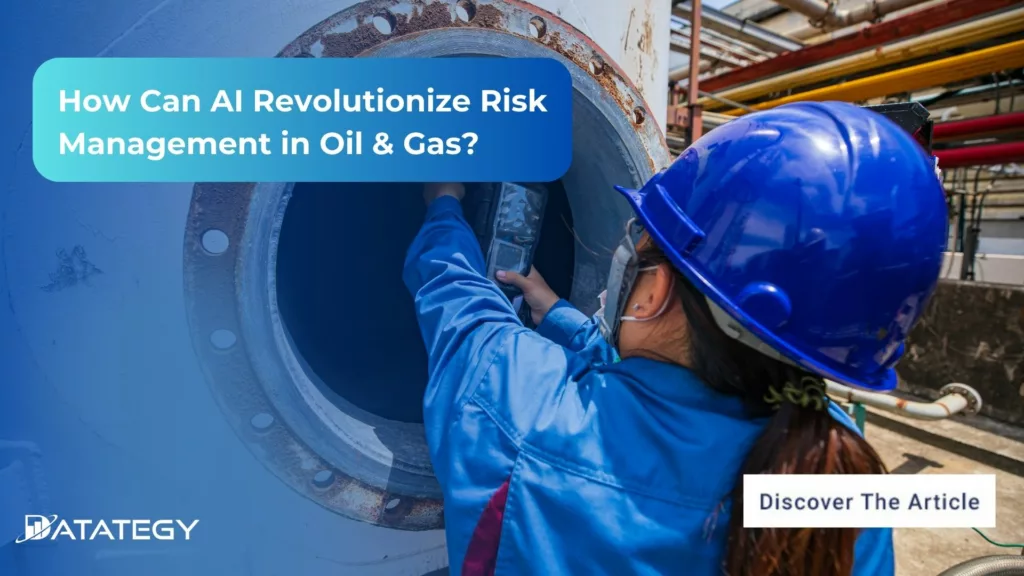
This article will explain how AI can enhance risk management in the oil and gas industry. It will also provide practical examples of AI’s applications in this field.
What does Risk Management Mean in Oil & Gas Industry?
The detection, evaluation, and control of different risks that may affect a company’s operations and stability are all part of the complex process of risk management in the oil and gas sector. This methodology has historically been dependent on historical information and traditional risk assessment techniques. But by including sophisticated predictive capabilities using AI algorithms into the risk management framework, artificial intelligence (AI) integration adds an innovative element.
Why is Risk Management So Important?
- Employee protection:
Ensuring the safety of employees is essential to efficient risk management. Complete risk assessments include physical and mental threats, along with safety measures, to create a safe and efficient workplace.
A resilient and motivated workforce is a result of safety procedures, mental health initiatives, and preventive measures. Protecting employee data in the digital age requires cybersecurity measures that include technology purchases, cyber threat education, and secure data handling procedures. Employee-centric risk management recognizes the workers as a critical asset and fosters a good organizational culture in addition to being ethically sound.
- Backing up machines and resources:
Risk management involves creating backup plans for equipment and resources to ensure the business can continue operating smoothly. To prevent data loss from unexpected disasters, cyberattacks, or technological issues, regular data backups and redundancy are necessary.
Sturdy backup systems save downtime in the event of interruptions by facilitating quick recovery and protecting sensitive data. These steps work better when cutting-edge technology like automatic backup programs and cloud storage are used. Testing backup systems on a regular basis guarantees their dependability, which is an essential part of risk mitigation for companies whose operations depend on easy and safe access to digital resources.
- Maintaining the reputation of a brand:
In the oil and gas sector, protecting brand reputation necessitates a proactive risk management approach. In spite of operational, regulatory, and environmental difficulties, the sector maintains a favorable reputation by anticipating and averting potential dangers.
It is important to do regular environmental impact assessments, adhere to strict safety procedures, and communicate openly about sustainable practices. Brand resilience is further strengthened by utilizing cutting-edge technology for risk assessment and real-time monitoring. Actively interacting with stakeholders, supporting community outreach, and exhibiting a dedication to corporate responsibility further cement positive industry reputations.
Insights into the AI market in oil and gas industry
By 2030, the oil and gas industry’s share of the worldwide AI market is expected to reach $2.9 billion.
In 2022, the predictive maintenance category held a dominant market share of almost 30.2%. The services category held a greater market share than 41.4%, while the upstream oil and gas industry recorded a value share of over 51.8%.
With over 38% of the worldwide market, North America commanded a significant market share in the AI for oil and gas sector. However, the Asia Pacific market is anticipated to grow at the fastest rate, 17.4% CAGR.
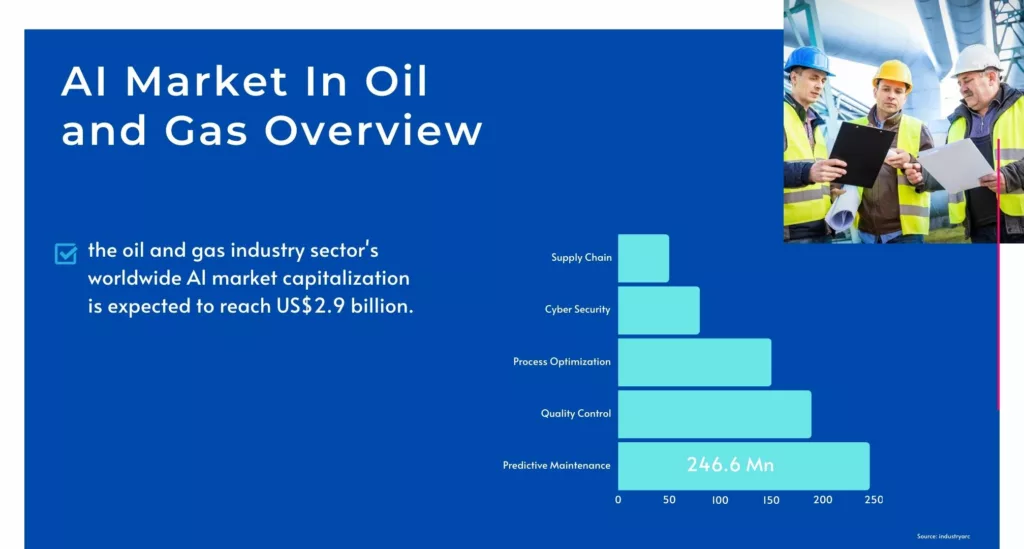
From Data to Action: How AI is Transforming the Energy Industry
AI and ML in the energy industry can change how we make, deliver, and use energy. Using smart algorithms and data analysis, they can make energy systems more efficient, safe, and sustainable. Learn more in this white paper.
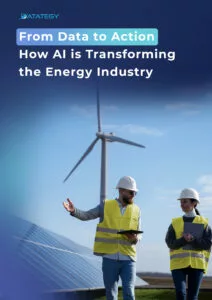
The Benefits of Using AI in Risk Management
1- Real-time Risk Assessment
AI-powered real-time risk assessment is revolutionizing the oil and gas industry’s decision-making process. It allows for the immediate identification and assessment of potential risks as they arise thanks to machine learning algorithms and continuous data analysis. according to the latest Deloitte research, AI can help to identify and predict potential safety incidents, such as leaks, spills, and fires, up to 80% earlier than traditional methods.
By improving situational awareness, this dynamic strategy enables quick reaction to shifting circumstances and dangers. Real-time risk assessment reduces the effect of unanticipated occurrences and guarantees proactive mitigation of any interruptions. Real-time risk assessment, which offers up-to-date insights, not only increases operational resilience but also dramatically lowers the possibility of unfavorable outcomes, making the oil and gas sector safer and more productive.
2- Improve Risk Forecasting
Improved risk forecasting made possible by AI is an innovative advance in proactive risk management in the oil and gas sector. Artificial intelligence (AI) computers go through enormous information to find complex patterns and anticipate possible dangers by utilizing modern data analytics.
By predicting dangers early, AI helps businesses take timely action. It also improves decision-making and gives an advantage in the oil and gas industry. This proactive approach reduces risks and creates a flexible operational environment.
3- Enhanced Operations with IoT
AI-enabled Internet of Things (IoT) optimization in the oil and gas sector brings about an evolution in productivity. according to Accenture, AI-powered IoT solutions can improve resource utilization by up to 50% by optimizing production schedules and asset management.
Real-time data on operational factors, ambient conditions, and equipment performance are provided by AI-driven IoT, which seamlessly integrates sensor networks. Predictive maintenance is made possible by this extensive data, which reduces downtime and increases equipment dependability.
The combination of AI and IoT improves decision-making by providing information about possible problems and operational trends. Consequently, businesses may achieve cost-effective, sustainable operations, optimize procedures, and proactively handle difficulties. In addition to increasing productivity, AI-driven IoT optimization puts businesses in a competitive position for long-term success.
4- Optimize Regulatory Compliance
Artificial Intelligence reduces the possibility of regulatory infractions by automating procedures and guaranteeing compliance with industry standards. It streamlines compliance processes by keeping businesses informed of evolving rules through ongoing monitoring and analysis.
According to Accenture, AI-powered solutions can help oil and gas companies comply with safety regulations by up to 80% by detecting and preventing potential safety threats.
AI-driven compliance techniques improve overall operational integrity while lowering the risk of legal problems through increased transparency and accuracy. AI turns become a vital instrument in an ever-changing regulatory environment, helping oil and gas firms to quickly handle difficult situations while showcasing their dedication to moral behaviour and legal requirements.
5- Increase Predictive Maintenance
AI-driven predictive maintenance transforms asset management in the oil and gas industry. Artificial intelligence (AI) systems forecast probable equipment failures before they happen by analyzing real-time data from sensors, machinery, and previous records. By being proactive, this strategy lowers operating expenses, minimizes downtime, and increases the lifespan of important assets.
According to McKinsey & Company. AI-powered predictive maintenance solutions can reduce maintenance costs by up to 40% by preventing unplanned downtime and reducing the need for emergency repairs.
AI-driven predictive maintenance ensures that fixes are made on time, optimizing performance and averting expensive failures by spotting trends and abnormalities. This innovative approach fosters a robust and economic environment in the ever-changing oil and gas sector while improving operational efficiency and adhering to sustainable principles. Resource allocation is based on real equipment conditions.
Create your Custom AI tool for Your Specific Oil & Gas Risk Management Needs with papAI
Leverage papAI to harness the capabilities of AI in addressing specific risk management challenges in the oil and gas field. Building your AI-powered solutions becomes essential as energy demands rise. With extensive data volumes and pattern recognition analysis, empower your company to make informed decisions, formulate sustainable risk management strategies, cut costs, and enhance overall operational resilience.
Experience the advantages of papAI by booking a demo now. Book a demo now to experience the advantages of papAI. Our specialists will guide you in incorporating AI into your risk management efforts. This guarantees a revolutionary strategy that suits the specific difficulties of the oil and gas industry.
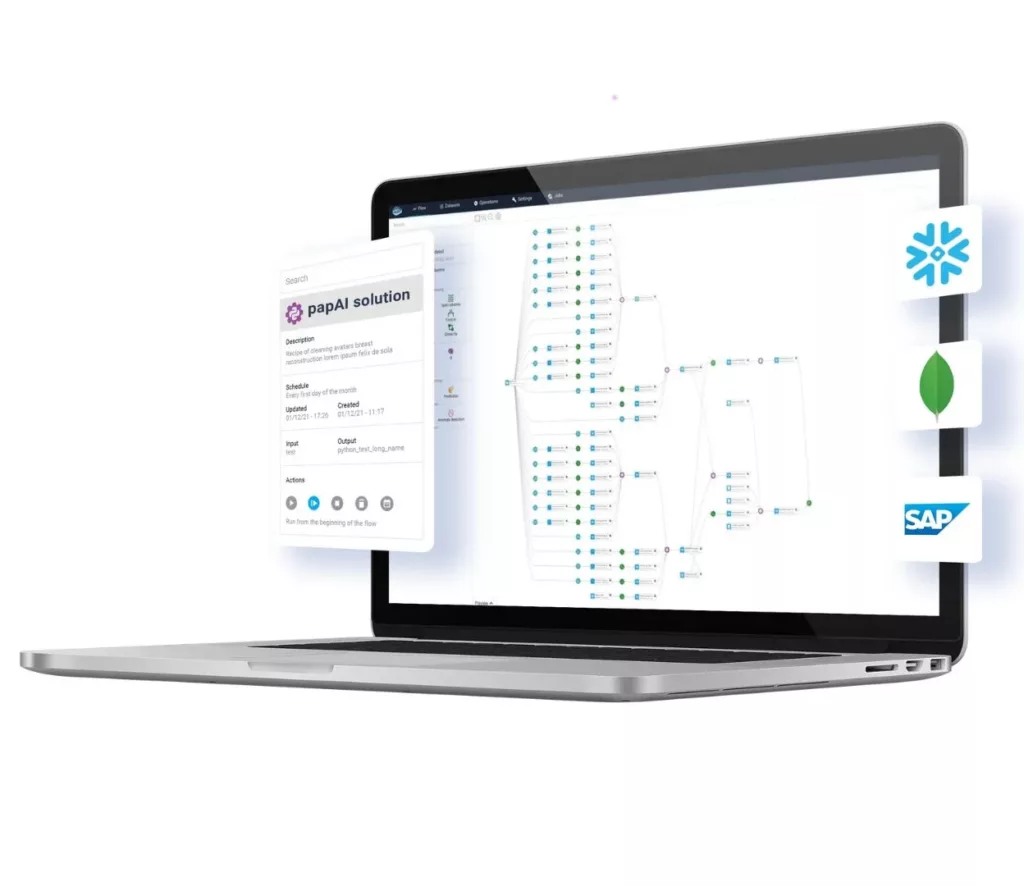
Q&A
The detection, evaluation, and control of different risks that may affect a company’s operations and stability are all part of the complex process of risk management in the oil and gas sector. This methodology has historically been dependent on historical information and traditional risk assessment techniques.
Risk Management is Important for Oil & Gas companies to improve employee protection, Back up machines and resources, and Maintain the reputation of a brand.
The Benefits of using AI in risk management are: Real-time Risk Assessment, improved risk Forecasting, Enhanced Operations with IoT, Optimize Regulatory Compliance, and increased predictive Maintenance.
papAI stands out as an excellent platform in risk management for the oil and gas industry due to its capability to leverage artificial intelligence, process extensive data, and provide pattern analysis, enabling companies to make informed decisions, develop sustainable strategies, cut costs, and enhance overall operational resilience.
Interested in discovering papAI
Our team of AI experts will be happy to answer any questions you may have
Transform Defense Logs & Rapport into Situational Awareness with AI
Transform Defense Logs & Rapport into Situational Awareness with AI...
Read MoreWhy AIOps Is Key to Cyber Threat Detection in Defense?
Why AIOps Is Key to Cyber Threat Detection in Defense?...
Read MoreHow AI Transforms Predictive Maintenance in Defense Equipment
How AI Transforms Predictive Maintenance in Defense Equipment In a...
Read More
